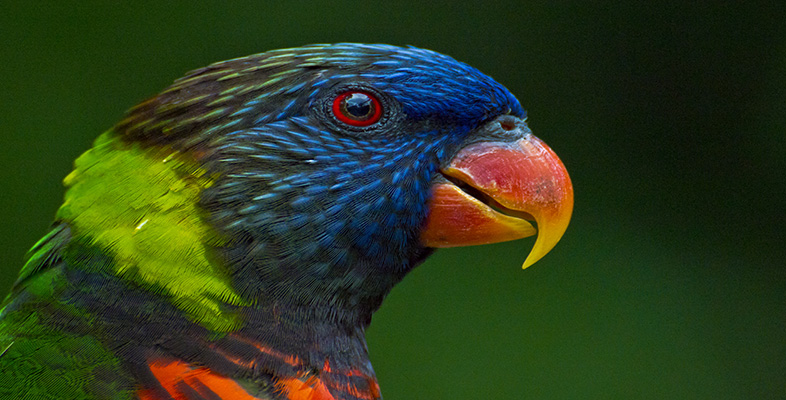2 Darwin and natural selection
While Darwin knew nothing about the mechanism of inheritance, he was very aware of many other aspects of living organisms. Among these, three are particularly emphasized in his theory:
-
The species that inhabit the Earth today are not the same species that existed in the past, although they do resemble them. This aspect of evolution was very apparent to Darwin from the fossil record.
-
Each species possesses a number of characters that adapt individuals within that species to their way of life and their particular environment. Much of The Origin of Species is devoted to detailed descriptions of the adaptations of individual species, for example the various beak shapes of finches on the Galapagos Islands.
-
Selective breeding of domestic species can produce characters in a diversity of forms. For example, dog breeders have produced numerous breeds that differ in characters such as ear length, stature and behaviour: different breeds have different forms of a character.
Darwin's theory of natural selection can be expressed as four propositions. These propositions are so important to an understanding of evolution through natural selection that you should try to remember them, although not necessarily word-for-word.
Darwin's four propositions
-
Within a given species, more individuals are produced by reproduction than can survive within the constraints (e.g. food supply) imposed by the species' environment.
-
Consequently, there is a struggle for existence, because of the disparity between the number of individuals produced by reproduction and the number that can survive.
-
Individuals within a species show variation; no two individuals are exactly alike (not even those we call 'identical' twins). Those with advantageous characters have a greater probability of survival, and therefore of reproducing, in the struggle for existence.
-
Individuals produce offspring that tend to resemble their parents (the principle of inheritance). Provided that the advantageous characters that promote survival are inherited by offspring, individuals possessing those characters will become more common in the population over successive generations because they are more likely than individuals not possessing those characters to survive and produce offspring in the next generation.
The essence of Darwin's theory is that natural selection will occur if three conditions are met. These conditions, highlighted in bold above, are a struggle for existence, variation and inheritance. These are said to be the necessary and sufficient conditions for natural selection to occur. To say that the three conditions are necessary means that, unless all three conditions are met, natural selection will not occur. Thus, it will not occur if reproduction does not produce more progeny than can survive, it will not occur if a character does not show variation, and it will not occur if variation does not have a heritable basis. To say that the three conditions are sufficient means that, if all three conditions are met, natural selection will inevitably occur and this can lead to change in the characters of a population from one generation to the next.
Darwin was concerned with evolution, i.e. change over time, and he proposed a process, natural selection, that could bring about such change. Evolution through natural selection is our main focus here. However, it is important to bear in mind that natural selection is also a process that can prevent change, i.e. promote stability. In other words, natural selection can occur without evolution. Furthermore, there are factors other than natural selection that affect evolution (some of which are considered in Section 3). The three conditions listed above are necessary and sufficient for natural selection to occur, rather than for evolution to occur. Nevertheless, the vast majority of biologists accept that natural selection is the most important process by which evolution is brought about.
Let us look a little more closely at the three necessary and sufficient conditions and consider how likely it is that they will be met. The first, a struggle for existence, is probably almost always met, because living organisms produce more progeny than are required to replace their parents when they die. The second condition, variation, is often but not always met. Some characters show virtually no variation between members of a species, whilst other characters show considerable variation. The third condition, inheritance, is only sometimes met; not all variation has a heritable basis. For example, toads vary in size. The two factors which make the largest contribution to variation in the body size of toads are variation in age (toads continue to grow throughout their lives) and variation in their environment (e.g. a good food supply). These are both external causes (i.e. body size is not a result of particular characters possessed by the toad). So body size in toads is not primarily an inherited character.
This last point brings us to an important aspect of natural selection, which was much discussed when Darwin first proposed his theory. This debate concerns the possible inheritance of acquired characters. As well as growing, individual organisms may develop particular skills or physical characters during the course of their lives as a result of differences in the way they live. Consider the human practices of ear-piercing, circumcision and decorative body scars. These characters, which are acquired deliberately during the course of an individual's life, are not inherited by that individual's offspring even though the practice may have been carried out for hundreds of generations. Likewise, a plant that has grown particularly large in a patch of good ground, or a toad that has grown very big because it lives in a garden full of food, will not pass their large size on to their progeny. So, inheritance of acquired characters does not occur.
Inheritance of a character occurs only if that character is passed from one generation to the next during reproduction. In other words, it is reproduction that is the crucial factor in natural selection. In a nutshell, natural selection is about the reproduction - rather than survival - of the fittest. (The term 'fitness' has a very particular meaning in biology.
